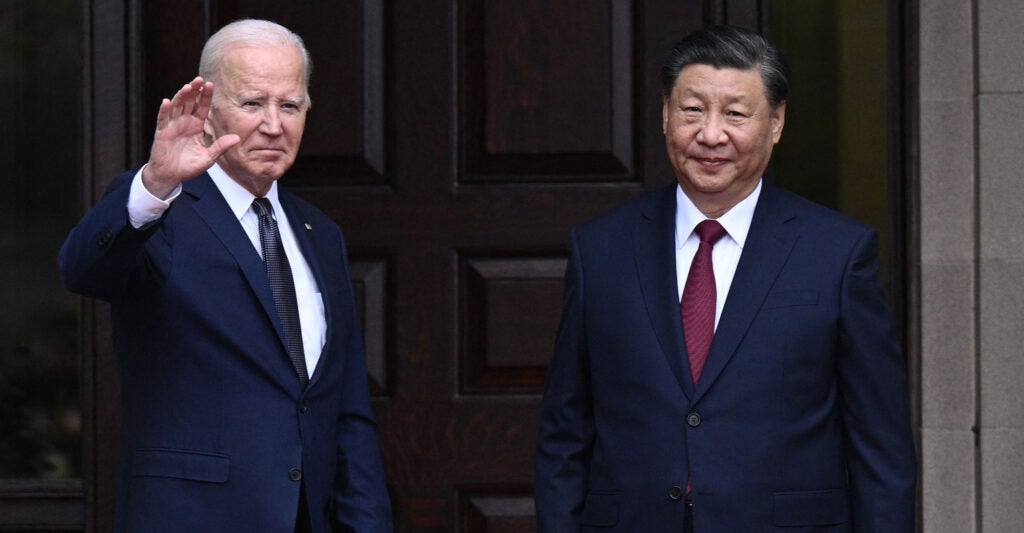President Joe Biden met last week for the third time with Chinese President Xi Jinping—the leader of a regime Biden’s own administration has repeatedly declared is engaging in genocide.
No White House statement about any of these three meetings has indicated that Biden specifically made this genocide an issue with Xi.
The day before Biden was inaugurated, as this column has noted before, then-Secretary of State Mike Pompeo declared that the People’s Republic of China was engaging in genocide against the Uyghur people in China’s Xinjiang region.
“After careful examination of the available facts, I have determined that the PRC [People’s Republic of China], under the direction and control of the CCP [Chinese Communist Party], has committed genocide against the predominantly Muslim Uyghurs and other ethnic and religious minority groups in Xinjiang,” Pompeo said. “I believe this genocide is ongoing, and that we are witnessing the systematic attempt to destroy Uyghurs by the Chinese party-state.”
“The United States has worked exhaustively to pull into the light what the Communist Party and General Secretary Xi Jinping wish to keep hidden through obfuscation, propaganda, and coercion,” he said.
Two months later, Biden’s State Department issued its report on human rights in China in 2020. “Genocide and crimes against humanity occurred during the year against the predominantly Muslim Uyghurs and other ethnic and religious minority groups in Xinjiang,” it said.
“These crimes were continuing,” it said.
In April 2022, Biden’s State Department released its report on human rights in China in 2021. It reiterated that “genocide and crimes against humanity” were occurring in Xinjiang.
In November 2022, Biden held his first summit with Xi in Bali, Indonesia.
“I’m really glad to be able to see you again in person,” Biden told Xi in public remarks at the opening of the summit. “We spent a lot of time together and—back in the days when we were both vice presidents, and it’s just great to see you.”
Biden also expressed gratitude to this leader of a genocidal regime for having congratulated him on his election. “You were kind enough to call me to congratulate me, and I congratulate you as well,” Biden told Xi.
“So, President Xi, I look forward to our continuing and ongoing open and honest dialogue we’ve always had,” said Biden.
A “readout” on this meeting published by the White House after it was over did mention that Xinjiang had been an issue—but it did not specifically cite the genocide taking place there. “President Biden raised concerns about PRC [People’s Republic of China] practices in Xinjiang, Tibet, and Hong Kong, and human rights more broadly,” it said.
Four months later, in March 2023, the State Department released its report on human rights in China in 2022. It once again cited the “genocide and crimes against humanity” in Xinjiang.
In November 2023, Biden and Xi held their second summit in Woodside, California.
“Well, Mr. President, it’s good to see you again,” Biden told Xi at the beginning of the summit.
“And to host you in the United States is a great honor and a pleasure,” Biden said.
The White House “readout” noted that Biden once again mentioned Xinjiang and “human rights abuses”—but it did not specifically cite the genocide. Biden “raised concerns regarding PRC [People’s Republic of China] human rights abuses, including in Xinjiang, Tibet, and Hong Kong,” it said.
Five months later, the State Department released its report on human rights in China in 2023. Its first sentence said: “Genocide and crimes against humanity occurred during the year in China against predominantly Muslim Uyghurs and members of ethnic and religious minority groups in Xinjiang.”
This Nov. 16, Biden met with Xi in Lima, Peru. “It’s good to see you and see all of you again,” Biden told Xi in his opening public statement. “You know, one year ago, we met in the Woodside Summit in San Francisco. And I’m very proud of the progress we’ve both made together.”
In the readout published by the White House after this summit, there was an unspecific reference to human rights—but not genocide. “The president noted the importance of human rights and the responsibility of all nations to respect their human rights commitments,” it said.
From January 2021, the month Biden was inaugurated, through September 2024, the latest month for which the numbers are available from the Census Bureau, the United States imported approximately $1.79 trillion in goods from China—while running a bilateral trade deficit of approximately $1.23 trillion.
Former President Donald Trump said in an interview with Fox News in February that if he were elected to another term, he would seek to impose tariffs on Chinese imports that may exceed 60%.
Republican Sen. Marco Rubio of Florida, whom President-elect Trump has now named to be his secretary of state, sent out a message on X in August: “Communist China has been able to get away with a campaign of widespread evil,” he said. “From committing acts of genocide against religious and ethnic groups, to spearheading forced sterilization and abortions, as well as dominating crucial minerals and technologies, and impeding the sovereignty of several regional partners, the U.S. will not tolerate these practices.”
Now, Rubio has the opportunity to lead U.S. policy on China in the right direction.
COPYRIGHT 2024 CREATORS.COM
We publish a variety of perspectives. Nothing written here is to be construed as representing the views of The Daily Signal.
